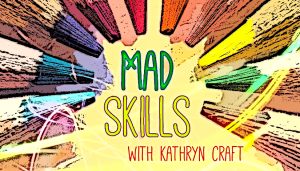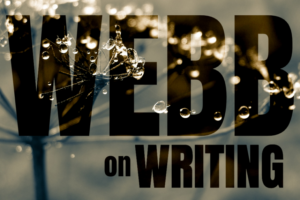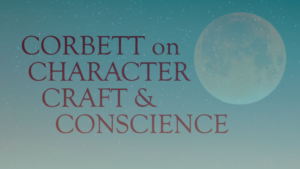Lamentations
WU community, I have a confession:
I’ve been in a “reading slump” for the last decade.
By “reading slump,” I mean that the novels I’ve finished belong to a highly exclusive club. I’ve accidentally pivoted toward nonfiction—Wendell Berry and Erich Fromm alongside Masha Gessen and bell hooks. Nothing wrong with that, of course, but sometimes I miss that sneak-a-book-under-the-covers feeling of a good, juicy novel.
So, what happened? Too much screen time killing my attention span (I mean, yes)? I’m getting old and now everything that’s not aligned with my personal preferences is what’s wrong with Kids These Days (…also likely)?
There are lots of possible causes, but only one has really stuck out to me: I don’t like it when books feel too much like a bad tour guide.
A bad tour guide? What?
When I talk to newish writers about how to “show, don’t tell,” I often use the metaphor of a guide taking a group on a nature walk. In this metaphor, the writer is the guide. A good guide will keep the pace of the group moving forward and on track without overexplaining or underexplaining. Every so often, they may stop or slow the pace of the walk to point out points of interest and share their specialized information (“Look at this cool bug!”).
The readers are the tour group, trusting the guide to ferry them responsibly from point A to point B.
When a nature walk breaks down, it might be for a few reasons: the guide used their time irresponsibly, meandering too much in the beginning and rushing the end; the guide lost control of the tour group due to carelessness or simply being boring, leading the group to try to guide themselves through the wilderness; or the tour guide marches the group through the underbrush like a drill instructor, pointing out everything but stopping nowhere.
Increasingly, I’ve been noticing a trend in contemporary novels toward the overly aggressive tour guide.
I pretty much feel like I’m being dragged along by the hair by a book while it yells, “LOOK AT THE PLOT. THIS IS THE PLOT!”
The moment of realization
I came to this conclusion while reading an adult fantasy novel published in 2022 by a Big 5 publisher. I actually finished the book, even though it gave me aggressive tour guide vibes, because the prose was so good I could mostly overlook how I felt like I was being breathlessly yanked along a single track, and that single track was the plot, and no we don’t have time to stop and breathe and briefly explore this fun little thing that maybe doesn’t push the plot forward much but adds some flavor to our journey.
What stuck out most was that that I viewed this book as extremely fast-paced to the detriment of the story. But when I went to record the book in my tracking app, I saw that 68% of people who had rated the book thought it was “medium” or “slow” paced.
I stared at this data for a while, wondering what planet I was living on.
It’s not content, it’s art
To me, this pattern—which, admittedly, I have noticed from a small sample size—feels like the content-ification (this is a word) of novels. Over the last decade or more, art of all […]
Read MoreHave I said all I need to about craft and the writing life? This is what I asked myself as I searched my mind and heart for a compelling topic to write about. I have literally thought about this post for weeks and kept coming up blank until I realized that was the very thing – this coming up blank – that has plagued my writing life for the past six months. I’d sit at my desk and stare at my WIP, move a few commas around, reread what I’d written, maybe manage to eke out a few sentences, and then walk away. Over and over again, week after week, month after month. It’s been a frustrating year in that regard, and I started doubting the premise of my WIP. Would anyone want to read this book anyway? And then I started doubting myself. Maybe I couldn’t pull off what I was trying to do on the page. Maybe I’d forgotten how to write entirely.
So I’d been paralyzed, so much so, that I’d been stranded at the same 30k word count for months.
I’ve Got Nothin’
Read MorePlease join us in welcoming guest Rebecca Anne Nguyen to WU today!
Rebecca Anne is an award-winning author, playwright and freelance writer. Her debut novel, The 23d Hero (August 13, 2024, Castle Bridge Media) was awarded the 2024 Readers’ Choice Book Awards Bronze medal. Her nonfiction book, Where War Ends: A Combat Veteran’s 2,700-Mile Journey to Heal, co-authored with Tom Voss, was the 2019 Foreword Indies Book of the Year Silver Award winner for Autobiography & Memoir.
Rebecca has published fiction, humor and nonfiction in many coveted outlets including The New York Times. Her short plays and one-acts have been produced in New York City, Los Angeles, and Miami.
Welcome, Rebecca!
As a reader, there’s nothing that hooks me faster than a great love story—especially if that love story is accompanied by a pitch-perfect sex scene. But as a writer working on my debut novel, crafting my own sex scene turned out to be more challenging than I could have predicted. I struggled so much, in fact, that I considered scrapping the sex altogether. There was just one teensy, tiny problem: without that scene, my plot would completely fall apart.
The sexual tension between my two main characters had been simmering for 200 pages and all roads—and every plot point—led to sex. I had to give them the night they’d both been longing for: their first moments alone, their first kiss, their first everything. If I didn’t let my lovers get that close, it wouldn’t be as gut-wrenching when I inevitably tore them apart.
Before I started drafting, I thought I knew exactly what should happen during The Sex Scene. How she’d let her dress fall to the floor. The way he’d look at her, almost pained, as if her beauty was more than he could bear to behold. I knew right where he would kiss her just as I knew the particular strain of ecstasy that would sweep through her body the longer he did. Theirs would be a culmination of ten years of longing and the most satisfying physical, psychosexual, spiritual experience of their lives!
But as soon as I got them in bed, I balked. I left them there—naked, on the cusp of a kiss—telling myself these characters deserved their privacy. On the next page, I began a new chapter: “The next morning…”
My beta readers were ready to strangle me.
“I wanted more!” my friend Heather scolded. “You left me hanging.”
The last thing I wanted was to leave the reader unsatisfied, so I swung in the polar opposite direction, writing down everything—and I mean everything—in graphic detail. The shape and heft of certain body parts. How those body parts interacted with other body parts. The viscosity that resulted from the interaction. I was blushing at my keyboard, and I had to take frequent writing breaks to let the blood rush back to my brain.
But when I thought about someone else reading what I wrote, I was filled with dread, embarrassment, even shame. There was nothing shameful in what my characters were doing, but had I gone too far in describing it so explicitly and leaving absolutely nothing to the imagination? I consulted romance novels, literary love stories, anything and everything with a sex scene, […]
Read MoreMe, walking into a cocktail party at a writer’s conference: I am confident in my writing ability. I have worked hard to improve my craft. I have insights and wisdom worthy of sharing. I deserve my seat at the publishing table.
Also me, walking into the same room: When is everyone going to figure out I’m a hack? I don’t deserve to be in this room.
Which one are you? Do you walk into a room full of writers and feel like you deserve to take up space in the publishing world? Or do fear being unmasked as an imposter?
Or maybe, like me, you do both.
Ever since I walked into my first writing workshop, I’ve been dangling from a pendulum that swings wildly between postures of confidence and crippling imposter syndrome. I believe it’s healthy to temper confidence with a bit of self-doubt, and I believe toxic self-doubt can be righted by remembering your true, honest accomplishments, even if they are small. I have trouble navigating the space between the two.
I’m still trying to figure out how to balance the confident fake-it-til-you-make-it mindset and imposter syndrome, but I’ve learned a few strategies that help me navigate the highs and lows.
Last month I turned in my third novel, The Forest Becomes Her, slated for publication in early 2026 from St. Martin’s Press. I’m already hard at work on my fourth novel, which is also under contract. Six years ago, I would have been giddy to know I would publish a novel. If someone had told me there would be four (and hopefully more) I would have passed out from joy.
But I also would have been skeptical. Why would anyone publish my novels? I’m a hack, I would have thought.
When I started working on my first novel manuscript, I embraced the fake-it-til-you-make-it approach to the publishing world. I believed in my book, but I didn’t have any relevant experience to include in a query letter. I looked at my unimpressive resume, and, instead of giving up, I decided to fill out my CV, one line at a time.
As I continued working on my novel manuscript, I entered contests. Flash fiction, short stories, novel excerpts. So many contests. Most of them led to disappointment, but I won several. I entered the wins into my scant author bio. Award-winning writer.
I submitted widely to literary journals, and, along with a pile of rejections, I received a few scattered acceptances, although, admittedly, they were all from smaller journals. I added these publishing credits to my bio. Published fiction writer.
I contributed essays to numerous websites that accept guest posts and wrote book reviews for a few websites. I was a blogger and book reviewer.
I volunteered to lead some small writing workshops. I was a workshop leader.
None of these minor successes involved platforms like Pulitzer or Ploughshares or The New York Times, but they were legitimate, hard-fought wins, and I was proud of them. I was making small inroads.
After a few years, the bio paragraph in my query letter began to feel respectable. I, however, wasn’t impressed. None of the lines in my bio were false. They weren’t exaggerations. I had won several writing contests, published a handful of essays, reviewed books, published short stories, and taught writing classes. […]
Read MoreMy blood pressure is rising, as I sit here pondering what has dominated my writing life lately and what, therefore, I should write my WU article about today. My blood pressure skyrockets as I wonder when and if I’m EVER going to get more words in on my WIP. And then I am struck with the answer: procrastination! For weeks, I’ve been sitting down (the ol’ butt-in-chair) and attempting to write, but instead, I look up recipes and write “to do” lists and take care of the dozens of writerly admin chores waiting for me in my inbox. I write a few sentences and delete them, gaze at my outline, and then I clean the kitchen and run errands. I do everything but put actual words on paper.
I have a deadline, you see, around the holidays at the end of the year, and I’m trying not to panic as I stare at my 28,000 word count that has remained the same for weeks and weeks. I know it’s possible to crank out a draft by December, but given the kind of writer I am and the amount of drafts I typically do, I should be on my third draft already, layering, layering, layering. Instead, I’m stewing over the plot, moving commas around, cutting pieces and filling in others, waiting to hear back from experts on a few historical details. Worst of all, I’m still trying to figure out how I want these details to drive the B story of the book. What is the B story?! I just don’t know how this will all come together. I don’t know if my heroine’s story is a worthy tale, or if I’m using the best structure, or if I pull this one off!
In the midst of all of these “I don’t knows,” I’m practicing some serious self-loathing and above all – procrastination. Ahh, procrastination. We are old friends, but I must admit, it has been quite a while since I have seen thee. I’m a “put in the work a little every day” kind of girl, at least since I graduated college many moons ago. But it seems that right now, the young, dithering, procrastinating Heather of yore is back.
WHY OH WHY IS THIS ONE FEELING SO HARD?
So you see, I’m actually glad I’m writing this post today because I could use a little self-examination to help get me going again. This is what I’ve come up with:
The Problem
The Solution
When our procrastination is at an all-time high, we need to reframe our thinking, alter our typical routines, and make room for an evolving writing process to set ourselves up for success. Here’s how.
Time constraints & Accountability. When I am at my most distracted, I have discovered that setting a timer for thirty minutes – in particular with a writer friend that I can sprint with – works miracles. Suddenly I have accountability! Not just that, I have a literal ticking clock! The pressure is on […]
Read MoreI haven’t been writing a lot lately, but I recently discovered something about myself as a writer: I am no longer jealous of anyone’s success – small, medium, or big Hollywood-blockbuster-type success. I realized this a few weeks ago when talking to a former colleague.
She emailed and asked if she could call me since I’m a “writing expert.” Hah, I thought. If she only knew. To me, expert means multi-published (e.g. more than five novels), award-winning, movie deals, merch deals, theme-park-licensing deals, and more. But I said sure, I’d love to chat.
She told me about a book idea she’d had and asked about the different paths to publishing. She asked me about the publication process for my YA novel, One Night. I told her about the pros and cons of self-publishing vs. traditional, being agented, un-agented, and the long slog of the search.
At the end of our call I said, “I hope it all works out for you and that you see your book in print the way you want to see it.” The weird thing is, I meant it. It wasn’t a B.S. statement or fake nicety. I actually do want her to succeed, in whatever way she envisions. I hope people get to read her book someday and that the process is easy for her.
I’ve noticed my lack of jealousy when scrolling social media, too. I used to feel a pang – ok, sometimes it was a giant wallop in which I gritted my teeth – of envy everytime I saw a new deal announcement, a starred review, a twenty-year-old with a five-book deal so lucrative she would never have to work (and her offspring wouldn’t have to either). But now it doesn’t bother me. And I’m even happy for people.
Who is this person? Is this what growth looks like?
Three things have helped me overcome my jealous rage (and believe me, it was at times a rage lol):
1. Time. I think the passage of time puts everything into perspective. Unfortunately, the passage of it isn’t something we can control. And for me, it’s been about twenty years.
2. A change in goals. Would I like to be a multi-hyphenate author? Sort of. I would like to have multiple works published. And I would like as many interested parties to read them as possible.
But I do not envision myself to be the Taylor Swift of writing anymore (oh, the things eighteen-year-old me used to dream about). That level of fame, notoriety, and scrutiny is not something I want. I don’t think I want to be a full-time writer, either. I used to fantasize about tapping against a keyboard all day while sipping coffee, but honestly the idea of sitting at a desk all day, doing anything, is not what gets me energized anymore. Sometimes I think I’d rather be inspired, and write stories only for myself and my own personal enjoyment.
With time, and age I guess, I’ve realized it’s ok to change. To change your mind, yourself, and your feelings.
3. Focusing on other aspects of life. It is good to have a goal, and a laser-like focus when it comes to your writing career. But it can be all-encompassing in a negative way. I’m a firm believer […]
Read MoreGetting a book-length manuscript to the finish line, polishing it, and launching it into the world require a single-minded focus–and a community of writers like this one to believe for us when the publishing journey gets rough. As a first-time author, I didn’t know what to expect. For a long time, no one was waiting for The Kindest Lie, so I had many years to stop and start, to play, and to delight in the fairy dust that is sometimes (if you’re lucky) sprinkled over a shiny debut. Then I signed a contract with William Morrow/HarperCollins for a second book, People of Means, which releases in February 2025. Anxiety took over, and I wondered if I could do it again. The second time around as an author isn’t easier, but I’m wiser and better prepared.
Here’s what I’ve learned:
You never master the craft. The book isn’t ready when you think it is.
After at least three years of writing workshops and several drafts of my first novel, I thought it was in good shape to send to agents in my quest for representation. Not so much. Following close to 100 rejections, I took a step back for a year-and-a-half and workshopped excerpts of my book at the Tin House Summer Novel Workshop and Kimbilio Fiction for African American writers. Then I engaged five writer friends to beta read for me. Only then did I get two offers of representation and choose the wonderful Danielle Bukowski of Sterling Lord Literistic. Subsequently, my fabulous William Morrow editor, Liz Stein, took my manuscript through three grueling rounds of edits.
When I began writing my second novel, I felt pretty confident that I knew what I was doing since I had done it once. Wrong! After sending early pages to Liz, I learned that the book needed a lot of work: structure, character development, relationships, motivations, and more. Under contract with a tight deadline, I didn’t have time to solicit beta readers or workshop the book. With Liz asking me lots of probing questions and helping me dig deeper, I revised multiple times until finally the book on the page came close to matching the vision in my head.
Life doesn’t pause for the publication of a novel. Don’t be afraid to ask for what you need.
I have a demanding day job leading corporate and internal communications for a large health care organization. Early in my writing days of my second novel, I got promoted to a director role and began leading a small team. The day job supports my writing habit, so no complaints there. But suddenly, I had more responsibilities, which made my writing time even more precious.
Soon after, my mother began to repeat the same stories and mail greeting cards more than once for the same occasion. A neurologist diagnosed her with Alzheimer’s, and I took on the role of caregiver. With a deadline for book two looming, I sold my mother’s house and moved her into a senior living community and helped her navigate this monumental life change. I desperately wanted to do it all, but I couldn’t. As a former journalist, I’m a stickler for deadlines but I knew I couldn’t meet this one. With great trepidation, I asked my […]
Read MoreSarah, an 8th grade English teacher, liked getting to school an hour before the students invaded her quiet classroom with their wonderful and terrifying presence, with their gangly bodies and their confusing slang and their beautiful brains that, one moment demonstrated Einstein-esque brilliance, and the next moment, the decision-making skills of a prehistoric reptile. My goodness, did Sarah adore her students! She really did. This was not sarcasm.
They were, however, exceptionally loud. Even the quiet ones were loud, though quietly so.
But in this hour before school started, Sarah was guaranteed a distraction-free zone where, if her grading was under control and her lessons planned, she could find time to work on her WIP.
Though finding time to work on her WIP felt nearly impossible these days. For starters, her grading was rarely under control, and her lessons always needed fine-tuning. Plus, she was trying to understand how on earth to parent college-age children, young adults who expected her to maintain a cheery, on-call presence, to answer the phone when they happened to call, and to listen, without judgment or advice, even when any idiot could see that a mother’s judgment and advice was precisely what they needed.
At the same time, she found herself supporting and loving her getting-along-in-years family members, a privilege that required a brain muscle she had yet to strengthen. Sarah also very much wanted to spend more than five minutes a day with her equally busy husband. After all, she loved him, and she realized that being an empty-nester was more fun when someone else shared the nest.
Along with the marriage-tending, the sandwich-generationing, and the full-time teaching, there were book edits to address whenever her lovely, patient editor sent along yet another round of revisions. Also a cover art artist to select. And a marketing and publicity plan to consider.
All this to say, Sarah was busy. Yet she remained hopeful.
Today, she told herself on the commute to school, there will be time to work on the WIP.
With great optimism, Sarah unlocked her classroom door, flipped on the motion-sensitive lights, did a swirly, flapping-armed dance so the insensitive lights would turn on, then took a seat at her desk, plugged in her laptop, and checked how many pieces of student work still had to be graded. The number was staggering. But before addressing the yet-to-grade work, she went to the NYT Games page for her morning ritual.
First (and it was always in this order) she played The Mini, then the Wordle, then she texted her father her Wordle score, then she proceeded to play Connections, which she liked quite a lot because she could see she was getting much better at it. Plus, the colors were pretty.
After that, she checked her school email, and on this particular day, read the NYT Athletic article about the Seahawks’s playoff chances (better after beating the Eagles; worse after losing to the Steelers), addressed a time-sensitive, student-related email, and fought the temptation to return to the NYT Games page where she could play the Spelling Bee.
No, she told herself. Today you will work on your WIP! […]
Read MoreWhen a beekeeper opens a hive, an intense moment of sensory magic follows. Bees rise from the hive and saturate the air with a gentle, but penetrating hum. Imagine being surrounded by a powerful Om that seems to come from inside your own head as the vibrations resonate in the tiny bones in your ears.
A warm, humid aroma of honey and beeswax fills your sinuses.
As a backyard beekeeper, I always looked forward to that Zen-like moment of calm. I approached my hives with giddiness, anxious for the contact high of being among the bees.
Several years ago, on a perfect August day, I went out to check on my hive. Something felt off. The air was too still. Ordinarily, dozens of bees would have been flying in and out of the hive, the foragers returning home loaded down with bright yellow pollen stuffed into the pollen baskets on their rear legs.
But that day, the hive was eerily quiet.
My heart rate ratcheted up as I got closer. I think my body understood before my brain did. Then I saw it. Outside the hive lay a pile of 40,000 honey bees. My bees, all of them dead.
I built that box hive with my own hands. I had studied and worked hard to care for these creatures. Thoughts raced through my mind. What had I done wrong?
It couldn’t have been Colony Collapse Disorder, a mysterious syndrome in which bees fly off and never return. My bees came home.
It couldn’t have been a parasite, a fungal, bacterial, or viral infection, because an infection would have taken time to work through the hive. My bees died in a pile. All at once. In my yard.
I soon realized the bees had been poisoned by one of my neighbors who applied a toxic lawn chemical. At first, I was furious. I had no idea who had used the lawn product so I looked at all my neighbors with suspicion. Was it YOU?
After a few days of side-eyeing everyone on my street and scrutinizing their impeccably manicured lawns, I came to realize the problem wasn’t that someone used a toxic chemical on their lawn. The problem was that these chemicals were legal and widely available. Although most other countries have outlawed these toxins, our government refuses to stand between landowners and their perfect green lawns.
As I stared at my silent hive and the pile of corpses, I wondered what was happening to the native pollinators. To the wild bees, the butterflies, wasps, and yellowjackets. Were they dying too?
What if they all died?
What if all our pollinators died?
That what-if question haunted me. What would our world look like without pollinators? What would happen to our agricultural system? Our food security? How would it impact our economy? Global politics? One-third of the food humans consume is the result of pollinators. If we lost a third of the food in a world that already struggles with food insecurity, who would claim the remaining food? Who would go hungry? How would it exacerbate the existing inequalities in the world? Would the economy survive? Would nations go to war?
These questions kept me up at night. What if? What if? What if?
As these questions buzzed around in my head, a story idea crystallized about […]
Read More
Permit me a moment of apostasy.
I realize it might seem perverse to pursue this topic in light of Jim Dempsey’s far more sanguine post from just this past Tuesday (“How Books Can Change Lives”), but for some time, I’ve had the uneasy feeling that the merits of storytelling have been oversold. The use of the mercantile metaphor is deliberate. In any ever-increasing number of realms, the “craft of narrative” is being used to justify the unjustifiable—the dishonest, the trivial, the crass, the sanctimonious, the unnecessary, and all manner of other dubious ends.
Tell the story has become the hallmark of the hustle. Give the folks a convincing, compelling tale and they’re yours, facts be damned.
We’re even told that facts are meaningless outside a narrative—an approach that turns scientific theory into a kind of fable.
A particularly compelling example of this appeared in an article from late last year in the open access journal Natural Sciences. The article was titled, “Pseudo-embryology and personhood: How embryological pseudoscience helps structure the American abortion debate.” It opens with this:
Scientists have identified more than one possible point at which an individual life, personhood, with its own identity, and defined in various ways, begins. There is no consensus among biologists as to when an independent human life begins. Those people who invoke the scientific community to justify the idea that fertilization is the unequivocal moment of independent identity for the human embryo are expressing mythological and political ideas, not contemporary scientific facts. These mythologies have deep and powerful roots, and they are hard to leave behind. We often look back on how eugenics distorted American politics a century ago, how women were being sterilized in the name of science, and we congratulate ourselves, thinking that such distortions could not happen again. They have.
Though quite technical, the piece is highly instructive on how embryology does not fit neatly into the stories various camps want to tell about when “life begins”—conception? The quickening? Birth? (Interesting aside: in many traditions, soul and breath are the same word, implying the newborn does not acquire a soul until it draws its first independent breath. And since reading this article, I encountered still another account of when a newborn acquires personhood, this one from Killers of the Flower Moon by David Grann. He recounts that among the Osage Indians, a child is not considered a person until he or she is given a name, which symbolically includes him or her in the social fabric of the tribe.)
The point: stories that masquerade as scientific truth (or any truth) betray the motives of the teller—to persuade without the messy, complicated, often inexplicable evidence that an honest inquiry requires.
It’s not just swindlers and ideologues peddling narrative snake oil, of course. Some genuine heavyweights have opined on the matter.
Camus famously remarked, “Fiction is the lie through which we tell the truth.” And Tim O’Brien, whose “How to Tell a True War Story” should be required reading for anyone who intends to put words on a page, defined the purpose of fiction as “getting at the truth when the truth isn’t sufficient for the truth.”
Back in June, 2019 (four years ago—Holy Moly, where did the time […]
Read MoreIt’s been a rough year in publishing. (Isn’t it always, though?) We keep getting hit with articles about sales and consolidations and literary agencies folding or firing people. Then there’s the AI problem—don’t get me started. I’ve been on the road to various events and writing retreats in the last six months, and I’ve spoken with a good number of author friends and I keep hearing about “soft sales” and fear of what’s next. It’s all too much doom and gloom for my taste, because you know what? There is something next. Storytelling is fundamental to our existence, so we will find a way to deliver those stories, even if things have to change a little bit…
Speaking of change, putting all of that doom and gloom together has validated something for me that I’d long ago suspected, and it appears to be true now more than ever. It’s the secret to winning in publishing. And it’s in plain sight.
The secret to winning is to learn how to pivot. To be flexible. To get loose and stretch and change directions.
You may need to pivot if you’ve suffered endless rejections on a particular project (or several), if your sales are flat, if it’s “not the right time in the market for this book,” if you’re burned out on your genre because no matter how many novels you write in that category, you can’t seem to make any traction…and more. There are lots of reasons to pivot. And there are lots of reasons we despair and become bound up over the idea of changing directions. Moving into unknown territory can feel scary. The truth is, however, that pivoting isn’t a bad thing. If fact, it may be the best choice you’ve ever made.
First and foremost, pivoting equals freedom.
When you pivot, you’re freed from your past and your track record and your numbers. Pivoting offers a new beginning, breathing room, and plenty of fresh opportunities. You may take a new pen name. Try a new genre. Work on a collaborative project. Find an agent or publisher better suited for your work. Become the publisher yourself, and be the one you’ve always wanted. It may spark ideas you’d never considered. Perhaps you learn a new aspect of storytelling beyond books.
Authors who are “winning in publishing” learn to pivot over the years of their writing career, and they lean into the renewal and the freedom it brings. It’s how they create their successes. When they hit a bump in the road, they buckle up their seatbelts and put their foot on the gas. They don’t despair (for long). When they find themselves in the midst of an emotional reaction to some perceived failure, they don’t flail and shut down. They don’t keep doing the same thing over and over again. Neither do they beat themselves up (for long). They learn to let go. They lean into the new and fresh. They relish the idea of being free, of finding the fun in the challenge again.
Pivoting may also mean a whole other kind of freedom. This kind of freedom is understanding and accepting where your boundaries lie. Perhaps you’ve had enough of the rat race, the thin promises, or the ups and downs of a business that […]
Read MoreDuring my prolific writing days, and even during my not prolific writing days, when I’d hear the term “writer’s block,” I believed it to be a self-indulgent myth. Either you were writing or you were not. You sit your ass in your chair and you write or you get up from your chair and decide you will not write.
I could give you a lot of reasons, excuses, lamentations for why I haven’t completed my next novel. I bet some of you know a lot of these reasons, excuses, lamentations, too, and likely 89.999% of them are valid. We can talk about how others may say that giving up writing for any length of time is for those who really aren’t dedicated to the craft, but that’s bull-taters. I sacrificed quite a lot for my writing in time, family, social life, etc, so I really don’t want to hear how I am not dedicated to my craft. I’ll guess many of you sacrificed much as well. Life can toss crappy curveballs and we sometimes must make decisions on what we feel is important, and sometimes the writing is not the more important thing: GASP! I know! I never thought I’d say that! Is this the eighth sign of the apocalypse?
Before the multi-year-slump, I could spit out a novel like it was nuttin’—doesn’t mean all of them were publishable but writing the words never was a problem and creating characters I loved wasn’t either. I wrote the first draft to Sweetie in 30 days (a challenge I gave myself) and it’s one of my all-time favorite published novels and loved characters. Writing created an excitement and contentment in me that nothing else could touch.
Never. Ever. Never. Ever. Never. Ever. NEVER EVER did I see a world where I was not writing. But stuff happened and the writing stopped. And stopped for quite some time.
And nowhere in all the time I was not writing did I believe in writer’s block. Nope.
But then I opened a novel I’ve had in my computer files, one that I’ve fiddled around with from time to time, here, there, yonder, skippity do dah day. The novel has good bones. It has interesting characters that excite me. I have no doubt I am a good writer. I have no doubt I can create good characters. I’ve known my “severe limitations” when it comes to plots/outlines, and it never before stopped me from sitting my ass in the chair and writing til my ass was numb.
But there I was scrolling through the novel and liking what I saw. I inserted a little here, moved a page there, renamed two characters who begged to be renamed. I had a little quiver of excitement build and I thought, “I have missed this part of me.” You know, the part where writing was like an important appendage before it’s been cut off and left with some phantom limb feeling…?
And then, out from the cantankerous ether ….
Anyone who has ever had an anxiety attack knows how it can be insidious, sneaky, like a noxious fog rolling in—one minute the sky and trees and birds are clear and then comes the smoky clawed tendrils wrapping around and through and within before […]
Read More


















